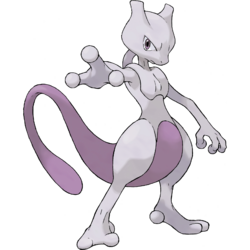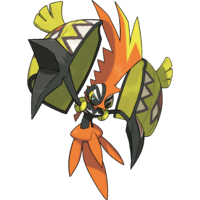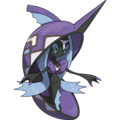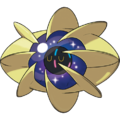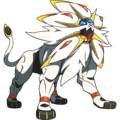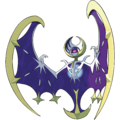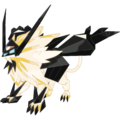Legendary Pokémon: Difference between revisions
| Line 256: | Line 256: | ||
{{main|Cosmic duo}} | {{main|Cosmic duo}} | ||
[[File:Cosmog.png|thumb|200px|{{p|Cosmog}}]] | [[File:Cosmog.png|thumb|200px|{{p|Cosmog}}]] | ||
The Cosmog line | The Cosmog line is the only evolutionary line to contain only Legendary Pokémon. {{p|Cosmog}} is a {{type|Psychic}} Legendary Pokémon introduced in [[Pokémon Sun and Moon]]. Cosmog has a major role in the plot as a Pokémon being studied by the [[Aether Foundation]]. [[Lillie]], the daughter of Aether Foundation's president, [[Lusamine]], spirits Cosmog away and nicknames it [[Nebby]], hiding it in her bag as she tries to learn more about it by visiting the [[guardian deities]]. Over the course of the game, Nebby evolves into {{p|Cosmoem}}, another Legendary Pokémon, and eventually the [[version mascot]] of the game: the {{2t|Psychic|Steel}}-type {{p|Solgaleo}} in Pokémon Sun and the {{2t|Psychic|Ghost}}-type {{p|Lunala}} in Pokémon Moon. Another Cosmog can be obtained by the player in the post-game. | ||
<gallery> | <gallery> | ||
File:790Cosmoem.png|{{p|Cosmoem}} | File:790Cosmoem.png|{{p|Cosmoem}} | ||
Revision as of 20:42, 22 October 2017
- If you were looking for the Pokémon identified in the Pokédex with the "Legendary" category, see Arcanine (Pokémon).
- If you were looking for the "Legendary Pokémon" website, see Legendary Pokémon (site).
- If you were looking for the "Pokémon LEGEND" type of Trading Card, see Pokémon LEGEND (TCG).
- Legend redirects here. For the Badge given by Iris or Drayden, see Badge → Legend Badge.
| This article is a featured article. This means that it has been identified as one of the best articles produced on Bulbapedia. |

Legendary Pokémon (Japanese: 伝説のポケモン Legendary Pokémon) are a group of incredibly rare and often very powerful Pokémon, generally featured prominently in the legends and myths of the Pokémon world.
Mythical Pokémon are a related but separate group of Pokémon, which are usually event-exclusive. Prior to Generation V, Mythical Pokémon were considered to be Legendary Pokémon in non-Japanese media.
No explicit criteria defines what makes a Pokémon a Legendary Pokémon. Instead, the only way to identify a Pokémon as belonging to this group is through statements from official media, such as the games or anime. Currently, while Type: Null and Ultra Beasts have some similarities to Legendary Pokémon, it has not been explicitly confirmed whether or not they are Legendary Pokémon; however, if the player chooses to filter out people seeking Mythical or Legendary Pokémon on the Global Trade System, people seeking these Pokémon will not be displayed.
Characteristics of Legendary Pokémon
Aside from the high statistics shared by most Legendary Pokémon, many can only be obtained once per save file (excluding Pokémon events); in order to obtain multiple, a player would need to trade for one.
The gender of most Legendary Pokémon is unknown (though there are seven notable exceptions: Latios, Latias, Heatran, Cresselia, Tornadus, Thundurus, and Landorus). In the core series games, no Legendary Pokémon can breed or hatch from an Egg. With the exception of Cosmog and its evolutionary family, Legendary Pokémon cannot evolve, although many are able to change form and are part of a duo or trio.
Much like starter Pokémon appear at the beginning of each regional Pokédex and their generation's portion of the National Pokédex, Mythical Pokémon typically appear at the very end, and Legendary Pokémon immediately before them.
Statistical average

|
This article contains old or outdated information, or has not been updated in a while. Please check the content of this article and update it as required. Reason: to include Silvally. |
| Stat | |||
|---|---|---|---|
| |||
| |||
| |||
| |||
| |||
| |||
In the anime
Legendary Pokémon typically make their anime debut in a movie, rather than first appearing in a normal episode. Many are worshipped as gods by particular groups of people. In the anime they are often only seen by special Trainers, usually Ash Ketchum and people who have a special connection to them. Ill-intentioned people often seek to possess them, due to their power and rarity.
Trainers using Legendary and Mythical Pokémon that they have in Poké Balls, or even as a non-owned Pokémon, is not unheard of. Noland befriended and fought official battles with an Articuno. Likewise, Brandon in the anime owned the three legendary titans in Poké Balls and trained them. Tobias owned the Mythical Pokémon Darkrai and the Legendary Pokémon Latios. In the Lily of the Valley Conference, another Trainer owned a Heatran. Finally, a Nurse Joy who visited the Pewter Gym under assignment of the PIA kept a Latias in a Poké Ball.
In the anime, there are some cases in which Legendary Pokémon are implied to breed in the wild, as seen with Lugia, Latios, and Latias.
List of Legendary Pokémon
Of the 1026 Pokémon species, 48 are Legendary Pokémon (4.68%). Each released generation has introduced at least three Legendary Pokémon.
Generation I
Four Legendary Pokémon were introduced in Generation I, with one trio and one standalone Legendary Pokémon.
Legendary birds
- Main article: Legendary birds
The three Legendary birds, also known as the Winged Mirages, are the resident Legendary trio of the Kanto region. Each of them is based on a mythical bird, and each is associated with a season (though none of the three is associated with autumn).
In the games, all three are available in the Kanto region in all of its appearances except for Generation II. Articuno takes up residence in the Seafoam Islands in the south, Zapdos in the Power Plant (next to it in Generation IV) in the east, and Moltres in a variety of places, Victory Road, Mt. Ember, or Mt. Silver, depending on the generation. In Pokémon Platinum, they are also found roaming Sinnoh. One also appears in Generation VI roaming Kalos before heading to the Sea Spirit's Den, where it can be battled and caught.
In the anime, the Legendary birds appear together in The Power of One, in which they rule over the islands surrounding Shamouti Island. If they are disturbed and begin to fight, only Lugia can stop them, though it will fail without additional help from the Chosen One. Separately, Articuno appears in Freeze Frame, Numero Uno Articuno, and The Symbol Life, while Zapdos appears in As Clear As Crystal, Pokémon Ranger and the Temple of the Sea, Doc Brock!, and An Electrifying Rage!, and Moltres appears in All Fired Up!, The Search for the Legend, and A Legendary Photo Op!.
Mewtwo
Mewtwo is a catlike Pokémon which is an enhanced clone of the Mythical Pokémon Mew. Mewtwo has two Mega Evolutions, which increase its base stat total to 780.
In the games, Mewtwo was too powerful for its creators and escaped from the Pokémon Mansion, wrecking it in the process. Mewtwo then made its home in Cerulean Cave, where all kinds of powerful Pokémon live.
In the anime, Mewtwo was featured prominently, appearing in several episodes of the original series, the first movie, and the first special episode. In the anime, Mewtwo was created by a group of scientists funded by Team Rocket boss Giovanni to create an enhanced clone of Mew for his own use. Although Mewtwo is initially a very angry Pokémon, viewing all humans as evil due to the acts of the scientists and Giovanni, after Ash Ketchum sacrifices himself to stop the fighting between Mew and Mewtwo, Mewtwo's heart softens, and it learns that some humans do care about their, and all, Pokémon. Meeting up with Ash again, Mewtwo is further shown that, despite being a genetically-enhanced clone of Mew, he and the other clones are no different to normal Pokémon, and because it erased Ash and his friends' memory at the end of their first meeting, realizes that Ash himself truly does care for others, even if he doesn't know them.
In the anime, another Mewtwo appeared in Pokémon the Movie: Genesect and the Legend Awakened, who also appeared as Mega Mewtwo Y.
Generation II
More Legendary Pokémon were introduced in Generation II, adding five more Legendary Pokémon for a running total of 9. The Legendary Pokémon introduced in this generation down can be separated into a trio and a duo.
Legendary beasts
- Main article: Legendary beasts
Like the Legendary birds of the previous generation, a second trio of similar types was introduced in the neighboring Johto region. These Legendary beasts, so named because their features are based on many different creatures, both real and mythical, as well as mythological deities, were trapped in the Brass Tower when it was struck by lightning and burned to the ground, resulting in their death. The trio was revived by the power of Ho-Oh and now roam across the land because of their great power. It is unknown whether the three were already a Suicune, Raikou, and Entei when they died, or whether they were simply three non-Legendary Pokémon, and Ho-Oh reincarnated them as the first Legendary beasts. In the case of the latter, it is possible that these three would be the original three beasts, who created multiple descendants. For example, a new Entei is said to be born whenever a new volcano is formed.
In the games, more than one of each exists, with only the trio that roams Johto after being discovered in Brass Tower's basement during Generation II and Generation IV being that of the legend. Each was captured and changed into a Shadow Pokémon by Cipher in Pokémon Colosseum, while one of the three, depending on the player's starter Pokémon choice, roams Kanto in Pokémon FireRed and LeafGreen, Entei for Bulbasaur, Raikou for Squirtle, and Suicune for Charmander.
In the anime, the Legendary beasts did not appear together until the thirteenth movie, despite being introduced in Generation II. It appears that an initial plan for the three Johto-era movies was to have each feature one of the Legendary beasts in a central role, with Entei taking a central role in Spell of the Unown: Entei and Suicune taking the stage in Celebi: Voice of the Forest. This did not pan out, however, possibly due to the canning of Johto's Celebi plotline, and Raikou was relegated to a role in The Legend of Thunder!, featuring anime characters based on Ethan and Kris, rather than the fifth movie, which focused on Legendary Pokémon from the then-upcoming Generation III instead.
Each of the beasts made an episodic appearance, as well, with Entei appearing in Entei at Your Own Risk, Raikou briefly appearing in Houndoom's Special Delivery, and Suicune having the most prominence (as in the games) through its appearance in Don't Touch That 'dile, For Ho-Oh the Bells Toll!, and Drifloon On the Wind!.
Tower duo
- Main article: Tower duo
The first game mascots that were also Legendary Pokémon, Lugia and Ho-Oh are a pair of Legendary birds which formerly resided in Ecruteak City atop tall towers, leading to their designation. However, when the Brass Tower, the home of Lugia, was struck by lightning and burned to the ground, they both flew away, Lugia resolving to make its new home in the Whirl Islands and Ho-Oh to search the world for a pure-hearted Trainer. The two are thought to be as closely related as they are polar opposites, being based on the eastern legends of the Fènghuáng and Ryūjin.
In the games, Lugia does not play a central role in the Generation II storyline, instead being mentioned only as having lived in Ecruteak City before the Brass Tower burned. It is found in the Whirl Islands in the Generation II games and their remakes if the player holds a Silver Wing. It reaches prominence in the storyline of Pokémon XD: Gale of Darkness, in which one is corrupted by Cipher to become the ultimate Shadow Pokémon, unable to be purified. It is also available on Navel Rock in Generation III, as an event-exclusive Legendary Pokémon.
In the anime, Lugia is featured in a central role in The Power of One, in which it is revealed that Ash is the Chosen One who must help it to quell the fighting of the Legendary birds. Another pair of them appeared when Ash and his friends traveled to the Whirl Islands in Johto. Likewise, in Pokémon Heroes: Latios & Latias, Latios was stated to have a father. This implies that some Legendary Pokémon can breed in the wild.
Ho-Oh has a much greater focus during Generation II, being named as the creator of the Legendary beasts. It can be found, if the player has a Rainbow Wing, atop the Bell Tower in the Generation II games and their remakes. It makes an appearance in Pokémon Colosseum, as well, as a reward for purifying all Shadow Pokémon and clearing Mt. Battle's 100-battle challenge, and on Navel Rock like Lugia.
In the anime, Ho-Oh is notably the first Legendary Pokémon that appeared (outside of the opening animation, at least), flying over a rainbow as Ash Ketchum started his journey, at the end of Pokémon - I Choose You!. Ash has subsequently seen it several times over the course of his journey, but has never come face-to-face with it. Ho-Oh featured in I Choose You! in a prominent role.
Generation III
Many more Legendary Pokémon were added to the roster in Generation III, with the eight new Legendary Pokémon bringing the total to 17. At this point in the series, Legendary Pokémon began to have a greater role in the storyline of the core series games, with the villainous teams plotting to reawaken the ancient Legendary Pokémon for their own use.
Many of the stories regarding the legendaries were slightly changed, or given a new perspective in the remakes of the first Generation III core series games, Pokémon Omega Ruby and Alpha Sapphire. Five of them also received new forms.
Legendary titans
- Main article: Legendary titans
This third trio of Legendary Pokémon, based on the golems of Hebrew legend, is featured minimally in Hoenn legend. This Legendary trio, as well as its master, Regigigas, is commonly considered to have the most complicated method of in-game availability, with puzzles made of braille in the Hoenn region being the keys to unlocking their mystery.
As complex as the method in which they are obtained is the legend of the titans, which is told in Pokémon Ruby, Sapphire, and Emerald and finally completed in Pokémon Diamond, Pearl, and Platinum. Long ago, an ancient Pokémon, Regigigas, was said to have moved the continents into their present positions by pulling them with ropes. After it was finished, it created in its image three Pokémon: Regirock, from clay, Regice, from ice, and Registeel, from magma. Ancient people, seeing that the Pokémon was so powerful, sealed it away in the Snowpoint Temple, while those it had created were separated from it and taken to the Hoenn region, sealed in three chambers, and left in the hopes that one day, someone would unlock the chambers and be able to tame the three so as to tame Regigigas. They are available in the Desert Ruins, Island Cave, and Ancient Tomb in Hoenn; as well as the Rock Peak Ruins, Iceberg Ruins, Iron Ruins in Sinnoh with an event Regigigas; and the Underground Ruins in Unova.
In the anime, the three Legendary titans starred together guarding the Tree of Beginning in Lucario and the Mystery of Mew, as well as members of Brandon's team in the Battle Frontier saga.
Eon duo
- Main article: Eon duo
While Latias and Latios do not have a distinct legend behind them, they are incredibly rare, with only one of the two available in normal gameplay and the other available through an event.
Latios and Latias take on counterpart availability in Pokémon Ruby, Sapphire, and Emerald as well as Pokémon HeartGold and SoulSilver, with Latios being a roaming Pokémon in Ruby and SoulSilver, and Latias doing the same in Sapphire and HeartGold. In Emerald, after the player has defeated the Elite Four, their mother will ask if the Pokémon mentioned on TV was red or blue, and depending on that, one of the two will be roaming Hoenn. The other member of the duo will be found on Southern Island, accessible by Eon Ticket, in Ruby, Sapphire, and Emerald, and in Pewter City, through the Enigma Stone event, in HeartGold and SoulSilver.
In Generation VI, Latias and Latios gained the ability to Mega Evolve. In Pokémon Omega Ruby and Alpha Sapphire, the Eon duo plays a much larger role in the main game's plot. They sense the grave danger Hoenn is about to face from the actions of Team MagmaOR/AquaAS, and while the player is talking to Steven on the east side of Route 118, LatiasOR/LatiosAS appears before the two, asking for their help. The player and Steven ride the Eon Pokémon to protect its counterpart from CourtneyOR/MattAS and their subordinate. After the fight LatiosOR/LatiasAS joins the player's party, holding its respective Mega Stone. Noticing the Mega Stone, Steven also gives the player a Mega Bracelet. After defeating GroudonOR/KyogreAS, the player receives an item called the Eon Flute from Steven, highlighting the special bond between the two. The items enables the player to summon the Eon Pokémon and use it to soar through the skies of Hoenn.
In the anime, Latios and Latias were the stars of Pokémon Heroes: Latios & Latias, in which the two guarded the city of Alto Mare. With a strong connection to the Soul Dew, the two were responsible for protecting it from Annie and Oakley, who wished to steal it. In the main series, Tobias used a Latios against Ash, as his second Pokémon in the first semi-final battle of the Lily of the Valley Conference. A Nurse Joy had a Latias when testing the Pewter Gym in SS025. Both Latios and Latias appeared in Hoopa and the Clash of Ages; in this film, both of them were capable of Mega Evolution.
Weather trio
- Main article: Weather trio
This trio of super-ancient Pokémon, known as the weather trio due to their weather-related Abilities, serve as the game mascots of Ruby, Sapphire, and Emerald Versions, and are the first Legendary trio to all be game mascots. The trio represents the three major components of the Earth: the hydrosphere, the lithosphere, and the atmosphere. Said to have expanded the land and sea, Groudon and Kyogre are among the most powerful Legendary Pokémon, while Rayquaza prevents the two from quarreling.
During the course of Pokémon Ruby and Sapphire, Team Magma or Team Aqua, depending on the version, seeks out Groudon or Kyogre respectively, with the intention of awakening them to make more homes for Pokémon of the land or sea. Eventually, the plan goes wrong, and the player is forced to defeat or capture the Legendary Pokémon to stop a global disaster. In Pokémon Emerald, instead, both teams are on the loose, intending to awaken their respective Legendary Pokémon, and only by interference from the player and Rayquaza does the fight end up resolved.
The three members of the trio received new forms in Pokémon Omega Ruby and Alpha Sapphire. Rayquaza is now able to Mega Evolve, and Groudon and Kyogre can undergo Primal Reversion while holding their respective Orb. Primal Reversion is considered the opposite of Mega Evolution. The latter is the outcome of the connection between Pokémon and human, and the former is derived solely from the Pokémon itself. While GroudonOR/KyogreAS are again sought by Team MagmaOR/AquaAS, Rayquaza is the target of a mysterious girl named Zinnia during the post game plot called Delta Episode.
In the game, their history is revealed: Thousands of years ago, during the primal age, the world was overflowing with natural energy. Primal Groudon and Primal Kyogre fought over that energy in endless furious clashes. In the face of Primal Groudon and Kyogre's great power, people could do nothing. But Rayquaza intervened, and its power overwhelmed that of the two Primal Pokémon, and peace returned to the world. A thousand years later, a meteoroid hit the earth, causing cracks in the ground that unleashed natural energy, causing Groudon and Kyogre to re-battle each other. Humans had a collective memory of how Rayquaza saved their race long ago, and that wish combined with the power of the Meteorite allowed Rayqauza to Mega Evolve for the first time and calm the two from quarreling.
In the anime, Groudon and Kyogre appeared in the two-part episode consisting of Gaining Groudon and The Scuffle of Legends. In these episodes, Team Magma and Team Aqua finally succeed in awakening the two, as in the games, though their conflict is resolved very quickly. Rayquaza appeared in Destiny Deoxys, where it fought against the pair of Deoxys. The weather trio all made a starring appearance in their Primal/Mega Forms in Hoopa and the Clash of Ages, engaging in a violent clash with many other legendaries.
Generation IV
Nine more Legendary Pokémon were introduced in Generation IV, bringing the total to 26 Legendary Pokémon. Many of the Legendary Pokémon of this generation have little connection to the plot of the games, instead being minor, post-Hall of Fame sidequests for the player to go on. Three of the newly introduced Legendary Pokémon (four prior to the Pokémon Platinum expansion of the Pokédex) are not in the Sinnoh regional Pokédex, appearing only in the National Pokédex.
Lake guardians
- Main article: Lake guardians
The lake guardians, Sinnoh's native Legendary trio, represent the spirit of all consciousness, with Uxie embodying knowledge, Mesprit embodying emotion, and Azelf embodying willpower. According to legend, having been created by the Original One, the trio have the power to tame the powerful dragons it also created.
In the games, Uxie, Mesprit, and Azelf are found in the caverns of Lake Acuity, Lake Verity, and Lake Valor, though Mesprit will roam Sinnoh after the player has encountered it, rather than battle immediately as the other two will. The trio are captured by Team Galactic's Commanders, Jupiter, Mars, and Saturn, and subjected to the experiments of Charon to draw out the Red Chain from the gems in their bodies. Cyrus summons Dialga and Palkia, and alone, the lake guardians' power is not enough to stop them. Giratina interferes and draws Cyrus into the Distortion World, where the lake guardians assist the player in navigation through Giratina's lair.
In the anime, the lake guardians appeared, first in spirit form, in Following a Maiden's Voyage!, Pruning a Passel of Pals, and Uncrushing Defeat!, to Dawn, Ash, and Brock. They were captured by J, who had been hired by Team Galactic, in The Needs of the Three!, and were freed by Ash, Dawn, and Brock to stop the power of Dialga and Palkia in The Battle Finale of Legend!.
Creation trio
- Main article: Creation trio
The Legendary creators of the Pokémon universe, the creation trio consists of Dialga of time, Palkia of space, and Giratina of antimatter. Like the weather trio before them, they each serve as the mascots of Sinnoh's trio of games, Pokémon Diamond, Pearl, and Platinum.
In the games, Dialga and Palkia are sought by Cyrus to destroy and then remake the universe without spirit, a feature he hates about humanity. In Diamond and Pearl, Dialga or Palkia can be caught at Spear Pillar, while Giratina may be obtained after the Pokémon League has been conquered. In Platinum, however, Giratina interferes with Cyrus's planned destruction of the universe, and may be captured in its home, the Distortion World, while Dialga and Palkia cannot be found until the Elite Four have been defeated.
In the anime, Dialga and Palkia appeared together, fighting in The Rise of Darkrai, while Dialga and Giratina appeared in Giratina and the Sky Warrior. The three appeared together in Arceus and the Jewel of Life and Hoopa and the Clash of Ages. Dialga and Palkia were also summoned at the Spear Pillar and chained by Cyrus in The Battle Finale of Legend!, but were freed when he escaped into another universe and the Red Chain was shattered by Ash, Dawn, Brock, and their Pokémon.
In Pokémon Diamond, Pearl, and Platinum only, Dialga and Palkia were referenced as "mythical Pokémon" (Japanese: 神話のポケモン mythical Pokémon); however, this pre-dates the term Mythical Pokémon (Japanese: 幻のポケモン Illusory Pokémon) and has a different Japanese name.
Cresselia
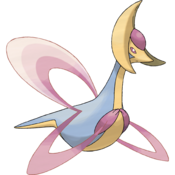
Cresselia is a Psychic-type Pokémon who represents the crescent moon, a sign of hope and good dreams.
In the games, Cresselia can be found on Fullmoon Island as part of a post-League quest to rid Sailor Eldritch's son of a nightmare. She will flee immediately, roaming Sinnoh and leaving behind a Lunar Wing, which will heal the boy. In Pokémon Black 2 and White 2, Cresselia can be found on Marvelous Bridge after obtaining the Lunar Wing in the Strange House.
Cresselia made her debut appearance in the anime in Sleepless in Pre-Battle!, in which she fought briefly against a Darkrai.
Heatran

Heatran is the embodiment of the planet's boiling core, appearing in Stark Mountain in Sinnoh, Reversal Mountain in Unova, and Scorched SlabORAS in Hoenn, where it was said to have been born at the same time as Dialga, Palkia, and Giratina created Sinnoh at the Spear Pillar and created the Battle Zone. Heatran is the only Legendary Pokémon with a variable gender.
Heatran first appeared in the anime in Arceus and the Jewel of Life, under the control of Marcus, and later appeared in Pokémon Ranger: Heatran Rescue! as part of a Pokémon Ranger rescue mission.
Regigigas
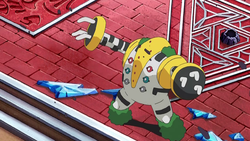
Regigigas is the master of the Legendary titans, having created them in ancient times and was said to have moved the continents in place, pulling them by rope.
In the games, Regigigas is found at the Snowpoint TempleDPPt, Twist MountainB2W2, and Island CaveORAS, though it will not awaken unless all three of the Legendary titans are in the player's party.
Regigigas appeared in the anime in Giratina and the Sky Warrior, in which it attempted to stop a glacier from destroying Ten'i Village. Another appeared in Pillars of Friendship!, in which it was hunted by J and defended by Brandon.
Generation V
Nine additional Legendary Pokémon were introduced in Generation V, totaling 35 Legendary Pokémon. Reshiram and Zekrom played a large role in the storyline of Pokémon Black and White, with the respective mascot Pokémon being a necessary and unavoidable capture to progress to the end of the game.
Swords of Justice
- Main article: Swords of Justice
Cobalion, Terrakion, and Virizion are a trio of Legendary Pokémon based on the titular characters of the 1844 French novel The Three Musketeers, and partially on hooved mammals such as deer, antelopes, oxen, goats, and horses. According to legend, they protect Pokémon from having their habitats destroyed by humans and have been known to have attacked human castles during the Middle Ages. Like the Three Musketeers, they are considered a trio but have a fourth, younger member in the form of Keldeo, a Mythical Pokémon, whom the other three rescued and raised after its home was destroyed by fire. All four of them can use their horns like swords, and learn their former signature move, Sacred Sword, at level 42 (43 for Keldeo, most likely to refer to it becoming part of the group later).
They made their anime debut together, in the fifteenth Pokémon film Kyurem VS. The Sword of Justice, where Keldeo was responsible for the freezing of the other three during a battle against Kyurem, and sought help from Ash and his friends. In the movie, Cobalion acts as the leader of the Swords of Justice, protecting Pokémon and humans alike through the world.
Forces of Nature

- Main article: Forces of Nature
Tornadus, Thundurus, and Landorus are a trio of Pokémon based on kami: Fūjin, god of wind, Raijin, god of thunder and lightning, and Inari, a fertility deity. Together the three represent the heavens and the nourishing effect the sky has upon the earth. According to a folktale retold by children at the Abundant Shrine, Landorus punished Tornadus and Thundurus for destroying the land with gales and thunderstorms, and a shrine was built in honor of him. In Pokémon Black 2 and White 2 they receive a new Forme, the Therian Forme, with their old Forme known as the Incarnate Forme; the Formes can be switched between with the Reveal Glass.
In the anime, the Forces of Nature were sought by Team Rocket in Unova from The Lonely Deino! until they were able to awaken them on Milos Island in Stopping the Rage of Legends! Part 1 and Part 2. Tornadus and Thundurus fought on the island, while Ash and his friends awakened Landorus to put a stop to the fight (they all appeared in Incarnate Forme during these episodes). They debuted in Therian Forme in Unova's Survival Crisis!, when Team Rocket once again attempted to capture them as the final goal of Operation Tempest. Together, they are said to have the power to control nature, which can be harnessed by one who possesses both Meloetta and the Reveal Glass.
Tao trio
- Main article: Tao trio
Zekrom and Reshiram represent balance through the aspects of Yin and Yang, respectively. Originally, they were a single dragon that helped found the Unova region's nation, but fighting between the two brothers who founded the nation split them into two halves. Despite this, the two Pokémon do not willingly fight each other.
In the games, Team Plasma hunt either Reshiram or Zekrom in Pokémon Black and White in order to use them to liberate all Pokémon from their owners. N captures one of them and defeats Alder. The other dragon emerges from the Dragon Stone the player possesses, and the player must capture it and use it to defeat N. After his defeat, N rides off on his dragon to a far-off region. In Pokémon Black 2 and White 2, which take place two years later, Ghetsis revives Team Plasma and captures Kyurem in order to freeze and take control of the Unova region. N confronts him with ZekromB2/ReshiramW2, but Ghetsis seizes the opportunity to fuse the Tao dragon with Kyurem using the DNA Splicers to create Black KyuremB2/White KyuremW2. The player defeats Kyurem and Ghetsis, restoring balance to the region.
Reshiram and Zekrom are the stars of Pokémon The Movie: White—Victini and Zekrom and Pokémon The Movie: Black—Victini and Reshiram along with Victini. Zekrom debuted in In The Shadow of Zekrom! causing Ash's Pikachu's electric crisis, and appeared in numerous flashbacks and fantasies afterwards. Reshiram also debuted in a cameo at the beginning of In The Shadow of Zekrom! and had a large role in the "Episode N" arc, as Team Plasma's target, appearing in What Lies Beyond Truth and Ideals!. Reshiram and Zekrom make a cameo appearance in Hoopa and the Clash of Ages.
Kyurem is related to Reshiram and Zekrom and represents wuji, which is the absence of yin and yang. Using the DNA Splicers, Kyurem can be fused with Reshiram or Zekrom into White Kyurem or Black Kyurem, respectively; with the same item, the fusion can be undone.
Kyurem is the star of Kyurem VS. The Sword of Justice along with Keldeo, where it seems as a ferocious Pokémon, and can change forms without the DNA Splicers. It is also capable of this when it appears in Hoopa and the Clash of Ages.
Generation VI
Three additional Legendary Pokémon were introduced in Generation VI, totaling 38 Legendary Pokémon. This is the first generation to introduce fewer Legendary Pokémon than the generation before it.
Aura trio
- Main article: Aura trio
The Legendary game mascots of Pokémon X and Y are Xerneas and Yveltal, and they form the aura trio along with Zygarde. Xerneas and Yveltal represent life and destruction, respectively, while Zygarde is said to monitor the balance of the ecosystem and reveal its power when the ecosystem is disrupted. Xerneas has the power to share eternal life, while Yveltal absorbs the life force of everything around it. Xerneas sleeps in the form of a tree, while Yveltal sleeps in the form of a cocoon. Xerneas and Yveltal have the Abilities Fairy Aura and Dark Aura, respectively, while Zygarde's Aura Break reverses the effects of these Abilities.
Xerneas has two Formes, appearing in Active Mode in battle and Neutral Mode otherwise. Yveltal has no form differences. Zygarde appeared only as Zygarde 50% Forme in Pokémon X and Y, but had two other Formes and two further components introduced in the anime and in Pokémon Sun and Moon. Zygarde's other Formes are Zygarde 10% Forme, a dog-like Forme that includes 10% of Zygarde's full power, and Zygarde Complete Forme, whose power is said to exceed that of Xerneas and Yveltal. Its further components are Zygarde Cells, tiny cell-like creatures that make up Zygarde's body, and Zygarde Cores, cell-like creatures said to be its mind.
In Pokémon X and Y, Lysandre captures Xerneas or Yveltal to use their power in the ultimate weapon to create a "beautiful world" in his image. Either Xerneas or Yveltal are captured by the player at the Team Flare Secret HQ upon awakening from their dormant forms. Zygarde 50% Forme can be found in Terminus Cave after the player enters the Hall of Fame.
In the anime, Xerneas and Yveltal starred in the movie Diancie and the Cocoon of Destruction, along with Diancie, where Xerneas and Yveltal are shown to be residents of the Allearth Forest. Xerneas made a minor appearance in Foggy Pokémon Orienteering!, being responsible for causing Ash and his friends to get lost in fog during the orienteering activity.
In the anime, Zygarde debuted in in Mega Evolution Special IV in its 50% Forme alongside a Zygarde Core. A Zygarde Core has traveled alongside Ash and his friends, nicknamed Squishy by Bonnie, since the beginning of the XYZ arc, and another Zygarde Core referred to as Z2 was captured by Team Flare. Both of these Cores have appeared in all three Formes of Zygarde.
Generation VII
Generation VII has ten known Legendary Pokémon. Five of these Pokémon are part of an evolutionary chain.
Silvally
Silvally is the evolution of Type: Null, a man-made Pokémon created by the Aether Foundation for Faba's "Beast Killer" project, which aimed to create a Pokémon with similarity to Arceus through data collected from Sinnoh's Canalave Library.
Although the project was deemed a failure and the resulting three models of Type: Null were put into cryogenic stasis, Gladion managed to evolve the stolen Type: Null that became his partner. He named the evolution Silvally.
It is unknown whether Type: Null shares Silvally's Legendary status.
Guardian deities
- Main article: Guardian deities
The guardian deities are Pokémon who protect the islands where they live. Each of the four main islands in Alola has a guardian deity: Tapu Koko on Melemele Island, Tapu Lele on Akala Island, Tapu Bulu on Ula'ula Island, and Tapu Fini on Poni Island. The Island Kahunas are each chosen by their island's guardian deity.
Cosmog line
- Main article: Cosmic duo
The Cosmog line is the only evolutionary line to contain only Legendary Pokémon. Cosmog is a Psychic-type Legendary Pokémon introduced in Pokémon Sun and Moon. Cosmog has a major role in the plot as a Pokémon being studied by the Aether Foundation. Lillie, the daughter of Aether Foundation's president, Lusamine, spirits Cosmog away and nicknames it Nebby, hiding it in her bag as she tries to learn more about it by visiting the guardian deities. Over the course of the game, Nebby evolves into Cosmoem, another Legendary Pokémon, and eventually the version mascot of the game: the Psychic/Steel-type Solgaleo in Pokémon Sun and the Psychic/Ghost-type Lunala in Pokémon Moon. Another Cosmog can be obtained by the player in the post-game.
Necrozma
Necrozma is a mysterious Psychic-type Legendary Pokémon that resembles the Ultra Beasts. It is believed to have come from an alternate dimension long ago.
Necrozma has two additional forms called Dusk Mane and Dawn Wings, in which it has absorbed Solgaleo and Lunala, respectively, introduced in Pokémon Ultra Sun and Ultra Moon.
Trivia
- Though Unown is not considered to be a Legendary Pokémon, in Spell of the Unown: Entei, it is shown in Molly Hale's book about Legendary Pokémon, its power (in large numbers, at least) appears to match that of Legendary Pokémon, and within the canon of the movie it is specifically referred to as a Legendary Pokémon.
- Heatran is the only Legendary Pokémon that can be either gender.
- According to interviews with Junichi Masuda in 2009, Legendary Pokémon are the most difficult to design names for because Game Freak strives to make sure that the names of Legendary Pokémon are universal across the different translations, so extra work must be put into their names to make sure that they work universally in all languages and don't conflict with anything else. This is consistent with the relatively small number of Legendary Pokémon that have had their names changed significantly outside of Japan (currently 16: the Legendary birds, the lake guardians, the Forces of Nature, Silvally, the guardian deities, and in Chinese only, the Mew duo).
- Giratina, Lugia, Ho-Oh, and fused Kyurem are the only Legendary Pokémon that have a battle theme which is shared with no other Pokémon.
- Each member of the Legendary beasts and the Tao trio has its own remix of each trio's designated battle theme:
- In HeartGold and SoulSilver, Suicune's theme uses bells, Entei's theme uses an electric guitar, and Raikou's theme is synthesized.
- Reshiram's theme employs a burning fire effect, Zekrom's theme employs a crackling thunder effect, and normal Kyurem's theme features an extra slapped bass part playing in the background.
- Rayquaza has a unique remix of Battle! (Super-Ancient Pokémon) in Omega Ruby and Alpha Sapphire, due to Groudon and Kyogre using Battle! (Primal Reversion) instead in these games.
- Each member of the Legendary beasts and the Tao trio has its own remix of each trio's designated battle theme:
- The Legendary birds are the Legendary Pokémon that have been available in the wild in the greatest number of core series games, each being able to be caught in eleven core series games (Pokémon Red, Green, Blue, Yellow, FireRed, LeafGreen, Platinum, HeartGold, SoulSilver, X, and Y).
In other languages
| ||||||||||||||||||||||||||||||||||||||||||||||||||||||||||||||||||||||||||||
See also
Notes

